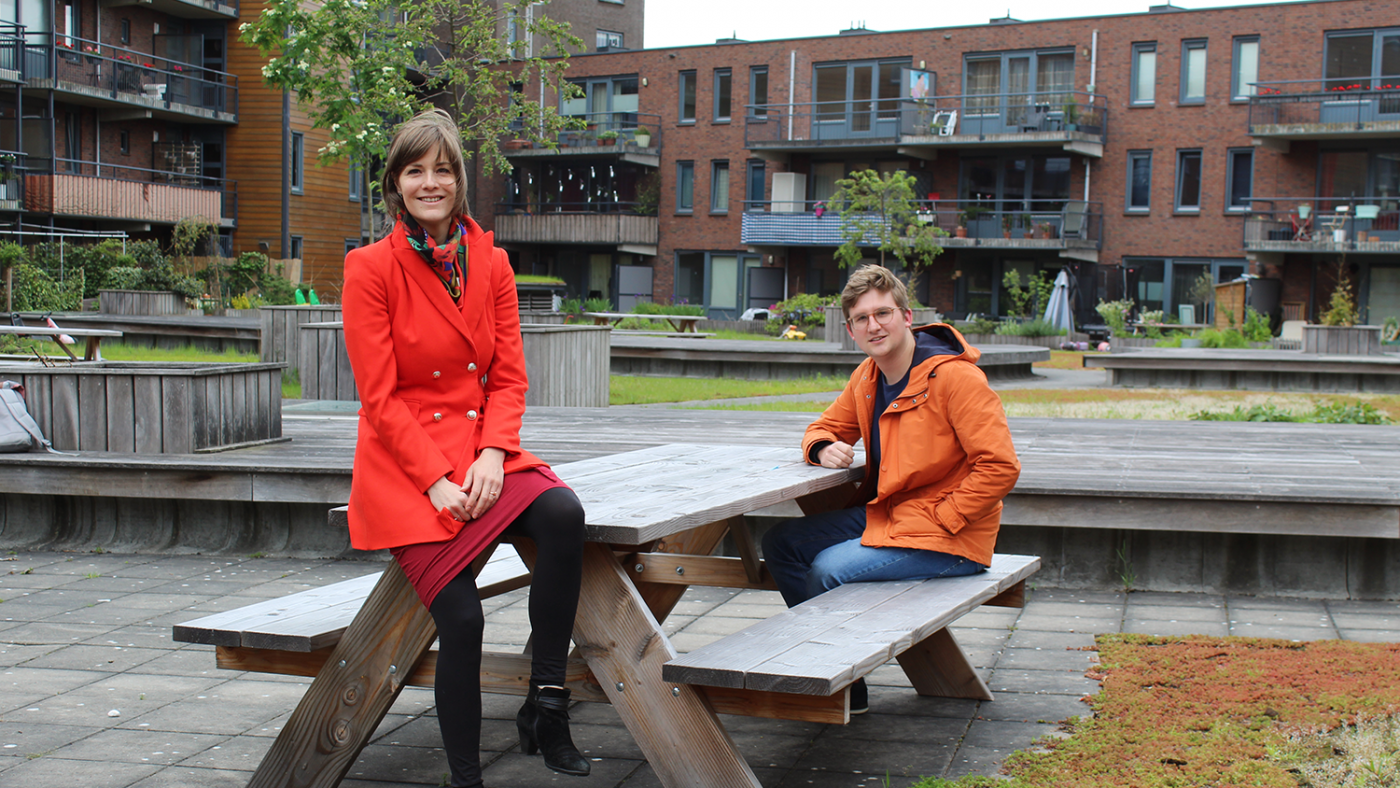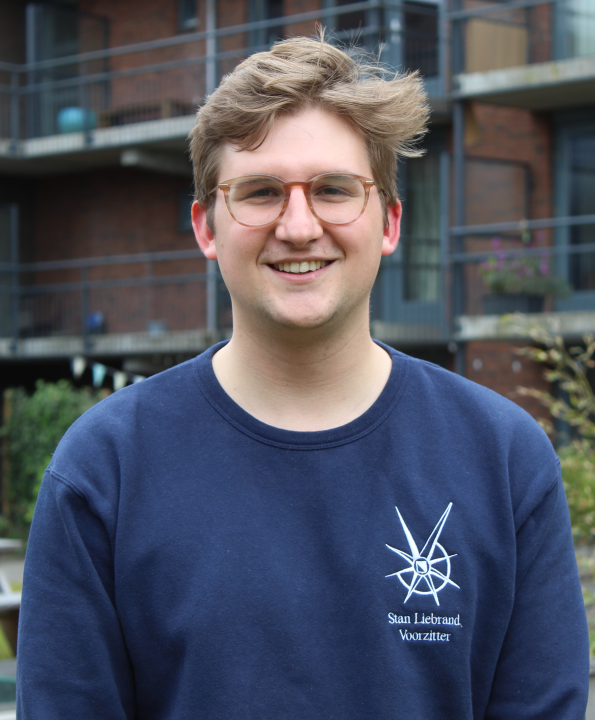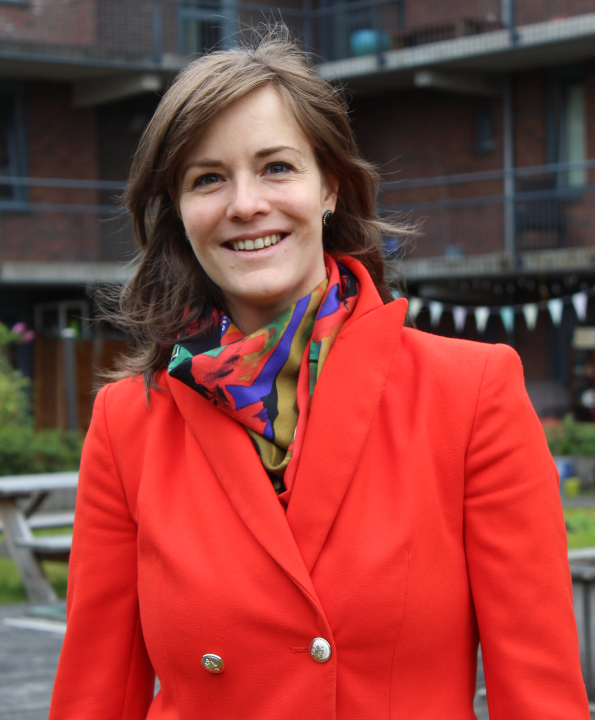10 years of Vidius: looking after the interests of every student in Utrecht

It was a bitter pill to swallow for some protesters in the Utrecht student world, back in 2011. Well-known student union USF ceased to exist after 70 years, merging with two other bodies: Oofu, an organisation advocating for study associations, and Linq, a group supporting co-determination.
“We had a hard time finding new board members and it would be a shame if Utrecht's student union would come to an end. Because we were still influential. We spoke regularly with aldermen about themes like student housing or public transport. We also sat down often with the university or the university of applied sciences to talk about the importance of vibrant student associations and high-quality co-determination". These are the words of Tjolina Proost, Vidius' very first president. She was in the middle of her Governance studies when she took on the role of coordinator for the training department of student union USF. She was elected to the University Council in the academic year 2010-2011, when she also became one of the founders of the new initiative. “We could see that there was an overlap between what Oofu, Linq and USF did. If these three organisations could join forces, they would be much more effective in advocating for the interests of students".
You had to come up with a new name, so the other bodies wouldn’t feel as though they had been incorporated by the USF. How did you come up with this name?
Tjolina: “We did some brainstorming. Christien, an assessor at the Faculty of Humanities and member of the founding group, was having some wine with her boyfriend when she suddenly had the idea: 'Vidius, voor iedereen die in Utrecht studeert (for everyone who studies in Utrecht)'. It just made sense, it was a Eureka moment. We immediately shared the idea by text and people’s responses were very enthusiastic.
Jelmer de Ronde, USF's last president, mentioned that there was quite a lot of discussion within the organisation about the path it was taking. If you’re advocating for the interests of all students in Utrecht, then you need to find some compromise. USF had a much more activist reputation. How difficult was it to leave that behind?
Tjolina: “In USF's final years, we had already sort of said goodbye to activism. The protest times of the 1970s had been over for some time. We didn’t just take our torches out and protest – instead, we wanted to be a constructive discussion partner. We felt like we would be taken more seriously that way, so we would be able to do more for students. Vidius didn’t organise a protest when the delay fine was introduced, for example. Instead, we organised an information campaign to tell students what to expect. But we were still a member of the national student union (LSVb in the Dutch acronym) and we also joined national protests when necessary.”

Vidius' current president, Physics student Stan Liebrand, nods in agreement. “This is very interesting to hear. I recognise it, too. First and foremost, Vidius wants a seat at the table to voice the interests of students. We’re not a party that’s just always angry, but we’re also not a lapdog for the municipality or the higher education institutions. It’s always a matter of finding that balance so we can truly achieve something.”
Jelmer de Ronde says Vidius wanted to become more visible for students than USF had ever been. Do you feel like you've accomplish that? Also, how does Vidius know what’s relevant among students?
Stan: “Students aren’t too familiar with Vidius. Shortly before applying to the board, I had never heard of Vidius either. I went to a debate that was organised by Vidius, and that’s how I learned about the organisation. Still, being well-known is not exactly a goal. We advocate for everyone who’s studying in Utrecht. That doesn’t necessarily mean that every student needs to know that, even as we do try to increase that familiarity. We provide legal assistance, for instance, or help out with rental complaints, so in those cases it’s good that students know where to find us.
“We focus on the topics that are relevant to all students, so all students want access to good student housing without exploitation, a good network of bicycle paths, and good public transport in the city. To find out what students in Utrecht think, we ask around among local bodies. There are a lot of them: study groups, sports associations, fraternities and sororities, religious associations, etcetera. That works very well. For example, when discussing the remodeling of the Merwede canal, we looked for input from the rowing associations. We also do our research among students – for example, we've recently conducted a survey about the way they interview potential roomates. We've also asked them about their housing needs: whether they’d prefer living near the city centre or a little further away but at a lower rent. We send out the surveys through the associations and they give us a fairly clear image of what’s going on."
“When there are controversial themes, such as how to distribute the board grants, we’ll invite all parties and ask ‘how should we solve this?’. We have a mediator role, so we investigate what’s possible in terms of compromises. To name but one example: in a recent document about board grants, UU told leisure-based student associations to return some money and they weren’t happy about that at all. Other associations were fine with the distribution of funds, though. At the same time, the university was coming up with more and more requirements in regards to how the money should be spent. You can let each and everyone pursue their hobby of choice, but that makes you weaker. It was clear that raising the budget was not an option, so we chose to send a unified message: 'okay, let's distribute the budget differently, but the associations themselves should decide how to spend the money.”
Eva Oosters, municipal council member representing the party Student & Starter, says she admires the way Vidius is a discussion partner for the city board. However, she does wonder how Vidius decides which position to take when interests may vary. Think, for example, of the legal battle regarding a building where squatters were living, which was rented by the USC for its lustrum party. Sustainability and diversity are two other matters that come to mind as well.
Stan: “There are always going to be people who disagree with you. If we fought for USC festivities on the Janskerkhof square, there would be students opposing us because of all the noise and mess. However, in general, it’s possible to define what the students’ interests are. We generally follow the consensus.
“Regarding the conflict between the squatters and the USC, we decided not to take sides. Instead, we provide legal assistance to both sides. We guide them and inform them about how they can stand up for their interests.
“As for issues like sustainability and diversity, we don’t tend to take the lead. We’re not a political party. But again, when considering these matters, we ask ourselves what the interests of all students in Utrecht are. If we were to conduct a survey about meat in canteens and the majority would say meat should still be served, then that would be our position. Vidius doesn’t intend to promote a political agenda. That doesn’t mean we oppose sustainability, not at all. In fact, we just created a document outlining how associations can be more sustainable. But we’re not forcing anyone to act on it.”

Vidius has three arms: one for educational institutions, another one for the municipality, and a third one for national politics. Which one did you focus on in the beginning?
Tjolina: “We had to build the association from scratch, paying attention to all three. We also considered the topics that were the most current and urgent at the time. So, at the municipality level, the hot topic was the new tram line; nationally, discussions were going on about the student loan system. Both of these themes were of great importance to the students. I think that’s why we, Vidius members, always try to find a balance between several different topics.”
LSVb's president, Lyle Mums, is a little jealous of the way Vidius conquered its position in the city. He regards it as an example for other LSVb members. Does Vidius' strength lie in that advocacy at the municipality level?
Tjolina: “It’s true that there’s no other representative body in the city that looks after students' interests like Vidius. In the beginning, we fought for students' interests by visiting municipal meetings, especially those allowing for citizen participation. They get to know you that way, so that’s how we got that position. But Vidius' other sides are important too and we shouldn’t neglect them.”
Stan: “We’ve got a clear image in the city, which is important. We still attend a lot of municipal meetings. We’ve also got a monthly meeting with Student & Starter and other student organisations, in which we talk about what’s happening in town and what matters to students. There’s a reason the municipality asked us to join forces with other student organisations and start a campaign to inform students about Covid – although we have to watch out that we’re not being used for their own ends. You can tell the city board is open to our opinions, but it can be difficult to actually realise plans at times. For example: we’ve been working on creating extra study spots in town, in empty offices and theatres, for a long time. They like the idea, but then we get sent from pillar to post when it comes to actually making it happen. There’s a powerful civil service at play.”
Study associations say they enjoy the training sessions organised by Vidius. So that's definitely useful. Pepijn Lapidaire, from University Council party PvdUS, says that, on certain themes, like students' wellbeing, you work together really well.
Stan: “With regards to co-determination, most of all we want to facilitate things. We organise training sessions for board members, put co-determination members in touch with each other, and we organise the Professors Night, a great party where professors get to choose the music and we award prizes to the best student board members and co-determination members. We shouldn’t want to get involved in the co-determination’s business. A theme such as students' mental health and wellbeing is huge, so we do like collaborating with the students in the councils.
“Nationally, we align with the LSVb, which organises protests, helping out if necessary. We were, for example, active in the organisation of the student protest against the student loan system on June 3.”
When you look back on ten years of Vidius, what are you proud of? And what are the main disappointments?
Tjolina: “I think it’s great that Vidius is still around. When we started it ten years ago, we feared for the existence of the Utrecht Student Union. Today, we have an organisation that still works exactly according to the ideas we envisioned at the time. Vidius is still very much alive and has developed pretty well.
“I don’t see any big setbacks, although there are always things that, looking back, you realise you could have done differently, or situations whose outcome doesn’t make you happy. The student loan system, implemented in 2015, is not good for the students, but I'm not sure how we could have prevented it. Some of the arguments we used back then to oppose the loan system, like when we said the the number of students continuing on to a Master's degree would drop, are coming true now. That puts it back in the political agenda."
Stan: “We’re a unique organisation that advocates for the interests of students in a professional way, something that no one else in this city can do, not in this manner. We have a large network in the field of students and education. We also dare to really sink our teeth into complicated themes, like a municipal vision document, or a sensitive case like the grant rules for student organisations where the interests vary so much. We can do that very well.
“But there are some decisions we’re not so happy about. Last year, a proposal about the landlord rule didn’t make it in the council by a very short margin. We wanted the number of tenants a landlord is allowed to have when renting individual rooms to go from two to three. We needed just one more vote. That’s a setback, but it doesn’t affect the essence of the association.
“What has affected us is the move from the city centre to the Utrecht Science Park (De Uithof). Many student organisations have an office at the Pnyx, a truly horrible building without any allure or attractiveness. We have to work in what’s basically a dumpster with dark hallways and fluorescent lighting only. In addition, there are all sorts of patronising rules: for example, we are not allowed to have a rubbish bin or a kettle. It’s absolutely the opposite of what student life should be. We’re still working on returning to the city centre.”
What can we expect from Vidius in the next ten years?
Stan: “I think we should continue on the current path. I hope we'll grow a bit more, become stronger. There are just five students on our board, against this enormous civil service. If we become a little more well-known among students, and tie more people to us, then we'll be able to increase our knowledge and do what we do even better.”
Tjolina: “I appreciate what Vidius has built in these ten years. They need to maintain that unique position. Not just in the city, but also its supporting role for the many associations in Utrecht. In my current job as policy advisor at a municipality union, I see how much my board years benefitted me and how many friends I made at the time. I hope that many more students will share that experience in the next few years.